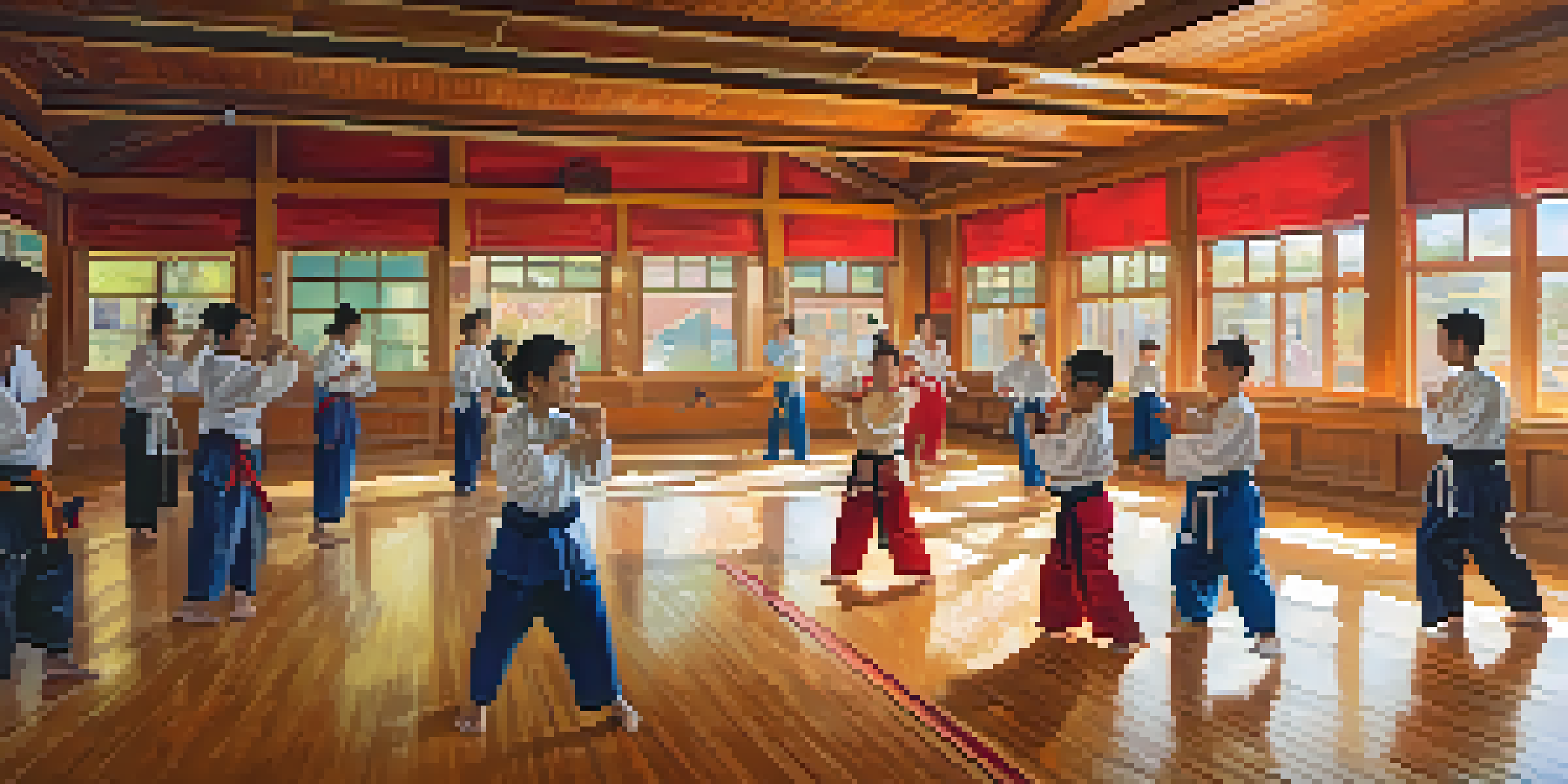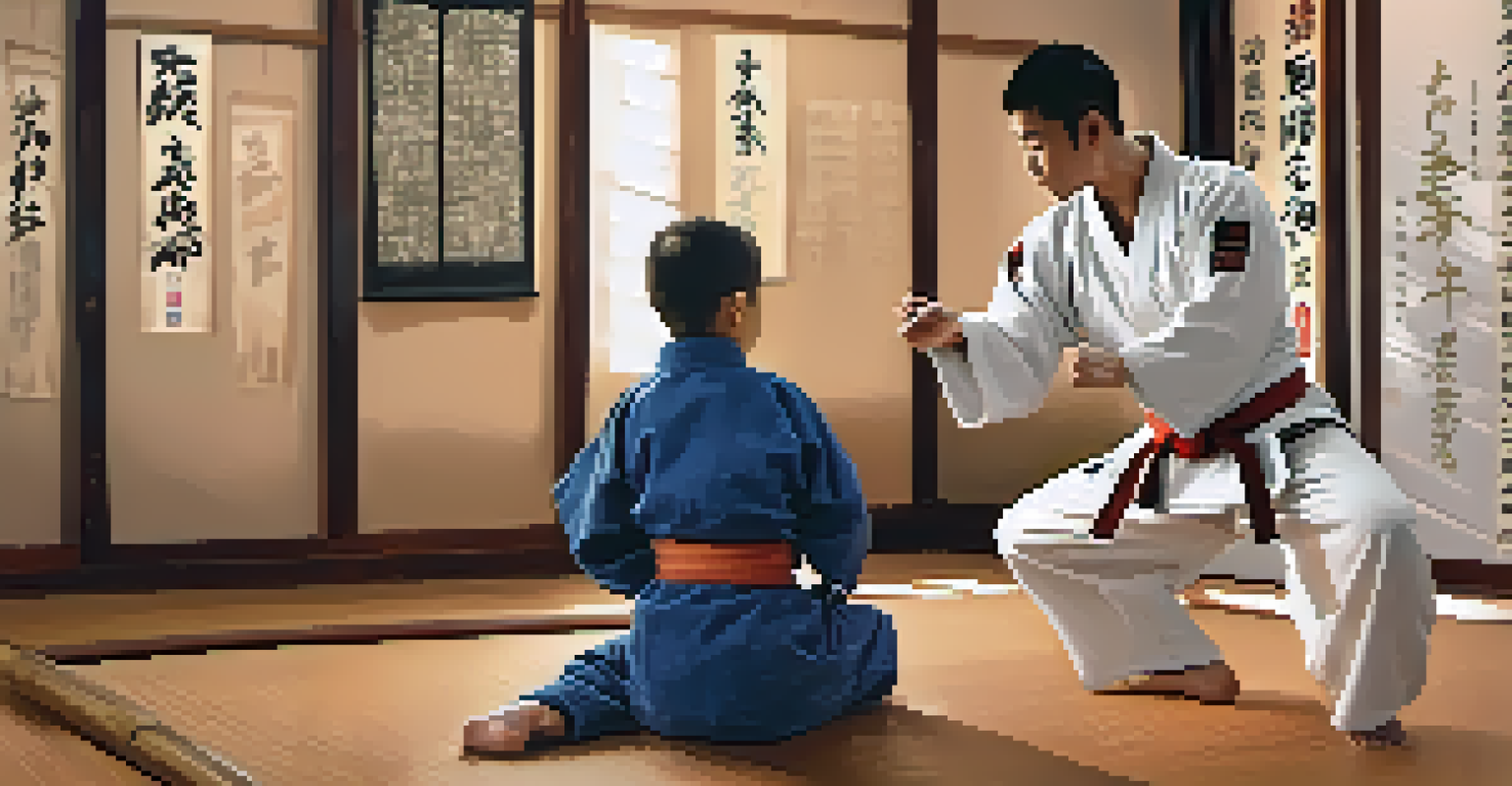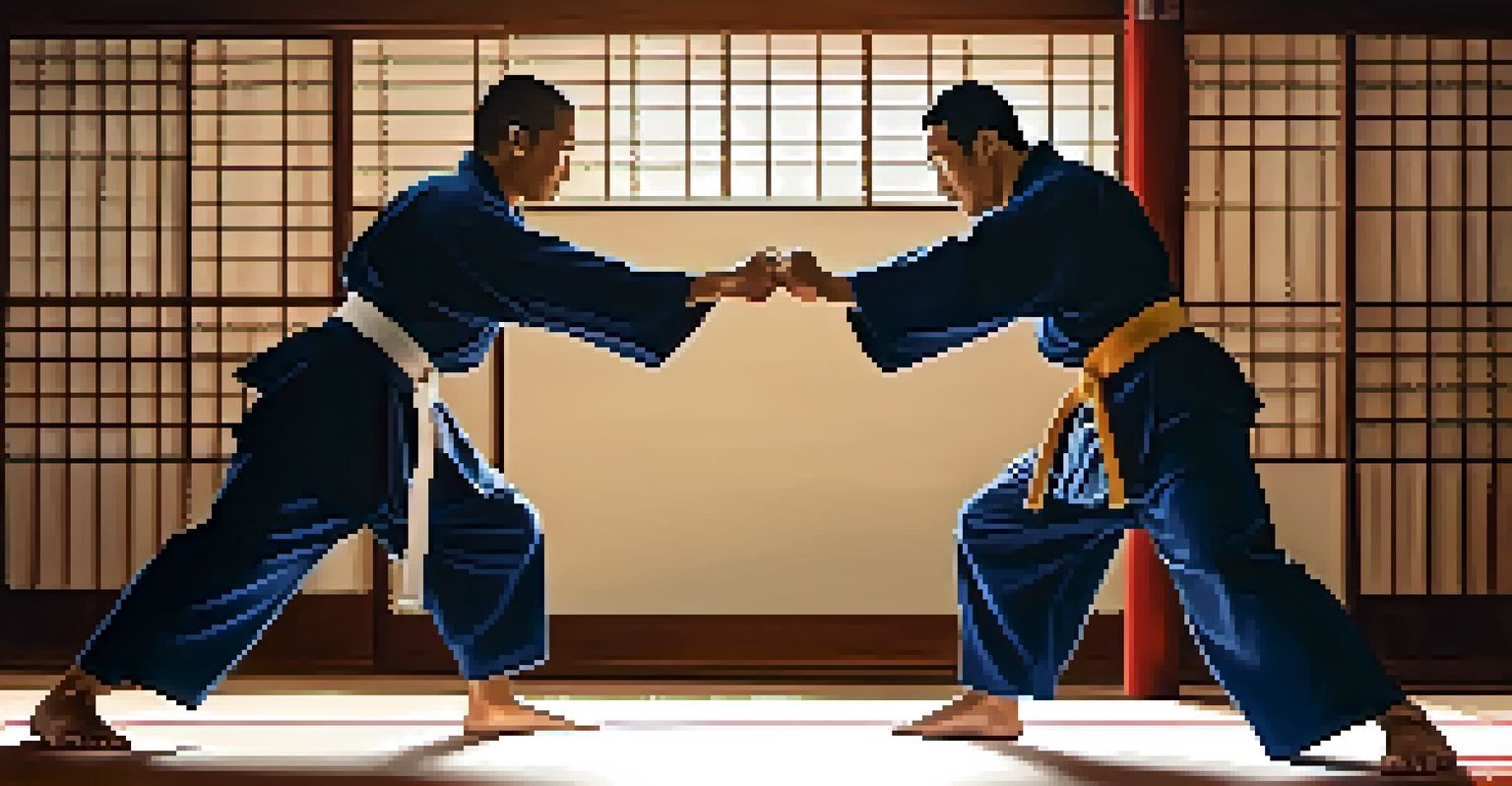Building Stronger Communities Through Martial Arts Training

Martial Arts as a Community Builder
Martial arts training does more than teach self-defense; it creates a sense of belonging. When individuals come together in a dojo, they form bonds that extend beyond the mat. This shared experience fosters camaraderie and encourages members to support one another, cultivating a strong community spirit.
Martial arts is not about fighting; it is about building character and community.
In many martial arts schools, the emphasis on teamwork and mutual respect lays the groundwork for lasting relationships. Students learn to rely on each other during drills and sparring sessions, which builds trust and friendship. These connections often blossom into supportive networks that benefit members in various aspects of their lives.
Additionally, martial arts offers a welcoming environment for people from diverse backgrounds. Regardless of age, gender, or skill level, everyone can participate and contribute to the community. This inclusivity is vital in creating a vibrant, dynamic space where individuals feel valued and connected.
Discipline and Personal Growth Through Training
One of the core principles of martial arts is discipline, which is essential for personal growth. Students learn to set goals, whether it’s mastering a new technique or achieving a higher belt rank. This structured approach not only enhances their skills but also instills a sense of responsibility and commitment.

As individuals progress in their training, they often experience a boost in confidence and self-esteem. Overcoming challenges on the mat translates to a more resilient mindset off the mat, empowering them to tackle life's obstacles with determination. This personal growth contributes positively to the community, as more confident individuals are likely to engage and uplift others.
Martial Arts Build Community Bonds
Training together fosters camaraderie, trust, and lasting relationships among diverse individuals.
Moreover, the discipline learned through martial arts encourages members to give back to their communities. Many martial arts schools incorporate service projects, allowing students to apply their skills in meaningful ways. This cycle of personal development and community contribution strengthens the bonds among members.
Promoting Health and Wellness in the Community
Martial arts training promotes physical fitness, which is essential for overall health. Regular practice improves strength, flexibility, and cardiovascular health, benefiting not just the individual but the community as a whole. When members prioritize their well-being, they set a positive example for others.
The ultimate aim of martial arts is not having to use them, but to develop oneself and others.
The mental benefits of martial arts cannot be overlooked either. Training provides an outlet for stress relief, allowing individuals to manage their emotions better. This improved mental health creates a more balanced community where members can support each other through life's challenges.
Additionally, martial arts often emphasizes healthy living, including nutrition and lifestyle choices. By encouraging healthy habits, martial arts schools foster a culture of wellness that can ripple through the community. When individuals prioritize their health, it can lead to a healthier, happier society.
Building Leadership Skills Through Training
Martial arts training is a fantastic way to cultivate leadership skills. As students progress, they often take on leadership roles, such as assisting lower-ranked students or leading warm-up sessions. This experience helps them develop qualities like patience, empathy, and effective communication.
Moreover, martial arts encourages members to step outside their comfort zones. Whether it’s competing in tournaments or demonstrating techniques, individuals learn to face challenges head-on. Embracing these experiences fosters resilience, a key trait in effective leaders.
Discipline Fuels Personal Growth
Martial arts instills discipline that enhances self-esteem and encourages members to give back to their communities.
As these skills develop, students are better equipped to contribute positively to their communities. They may take on volunteer roles, lead local initiatives, or mentor younger students, further strengthening community ties. The ripple effect of these leadership qualities can inspire others to follow suit.
Fostering Respect and Tolerance in Diverse Communities
Martial arts training inherently promotes respect for others, regardless of their background. Through the practice of bowing, addressing instructors formally, and following etiquette, students learn the importance of mutual respect. This foundation is crucial in fostering a culture of tolerance within the community.
As members train together, they engage with diverse perspectives and cultures, enriching their understanding of one another. This exposure helps break down barriers and promote acceptance, creating a more harmonious environment. Students learn that differences can be strengths rather than obstacles.
Furthermore, martial arts often incorporates teachings about humility and compassion. These values encourage individuals to look beyond themselves and consider the well-being of their fellow community members. Such an inclusive mindset can lead to a more cohesive and supportive society.
Creating Safe Spaces for Personal Expression
Martial arts dojos serve as safe havens where individuals can express themselves freely. The supportive environment fosters creativity, allowing students to explore their unique styles and techniques. This sense of freedom is vital for personal growth and self-discovery.
In many cases, martial arts training can be therapeutic, providing an outlet for emotions. Students often share their struggles and triumphs with one another, creating a strong support network. This openness encourages vulnerability and authentic connections, enhancing the overall community.
Leadership Skills Through Training
As students progress, they develop essential leadership qualities by mentoring others and facing challenges.
Moreover, the emphasis on personal expression in martial arts can inspire creativity outside the dojo. Members often apply the lessons learned in training to their artistic pursuits, leadership roles, and community involvement. This cross-pollination of ideas enriches the community, making it more vibrant and engaging.
Encouraging Lifelong Friendships and Mentorships
One of the most rewarding aspects of martial arts training is the lasting friendships formed along the way. As individuals train together over the years, they create bonds that often last a lifetime. Shared experiences, challenges, and victories deepen these connections, making them invaluable.
Additionally, mentorship plays a significant role in martial arts. More experienced practitioners often guide beginners, offering support and encouragement. This relationship not only helps newcomers but also reinforces the mentor's skills and knowledge, creating a cycle of learning that benefits the entire community.

These friendships and mentorships extend beyond the dojo, impacting members' lives in profound ways. They become a network of support during difficult times, celebrating successes together and providing guidance when needed. This sense of unity enriches the community, fostering a culture of care and collaboration.